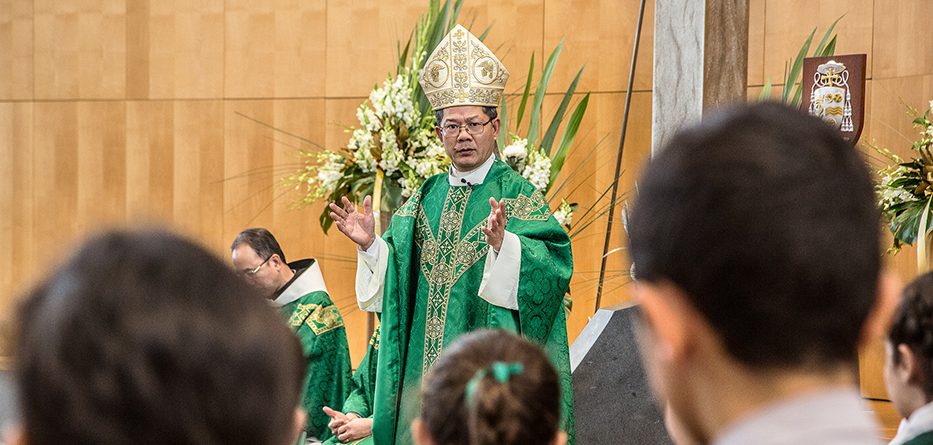Most Reverend Vincent Long Van Nguyen OFM Conv DD STL, Bishop of Parramatta
Homily at Solemn Pontifical Mass of the Fourth Sunday of Advent in Year B at St Patrick’s Cathedral, Parramatta
24 December 2017
My dear friends,
We have all had to deal with unexpected moments when things did not go our way, our plans failed and our lives were interrupted. Several years ago, when I was a Parish Priest in Melbourne, I planned to renovate the church among other things. I had done everything in preparation for the building project when I was asked to put it aside and move to Rome. It was a difficult decision and I was reluctant to take on a new assignment in another country. But in hindsight, I realise that it was one of those interruptions that served to form me into the person that I am today. I put it down to God’s invitation for me to go out into deeper waters.
Scriptures on this 4th Sunday in Advent offer us stories of faith that teach us how to respond to life’s unexpected moments. Whether they are big or small inconveniences, dramatic events or everyday frustrations, these are moments where the rubber hits the road. Our faith is put to the test; our horizons are stretched; our capacity to love is deepened and our lives are transformed.
In the first reading, we hear of the story of King David. He had settled into his royal palace after a series of military conquests. Then, he turned his attention to consolidate his power by building a new temple in Jerusalem. It seems like a noble purpose. However, David’s plan was jettisoned. He was told through the prophet Nathan that God was not interested in the house of brick and mortar. Rather, God was more concerned for the well-being of the people. “I will provide a place for my people Israel. I will give them rest from their enemies”. In other words, God lives in his people rather than in buildings. God is God of relational accompaniment. As a consequence, David’s priority ought to be building a house of justice, harmony and peace for the people.
This is one of the deepest strands that runs right through the biblical narrative: The God of Israel is God of relational fidelity and freedom. He cannot be controlled or limited by human desire for certitude. He cannot be named; he cannot be seen; he cannot be housed; he cannot be contained in any human creed or formula. The transcendence of God defies our attempt to domesticate and make him like us. This is why Jesus in his parables and gestures consistently challenges our stereotyped attitudes, collapses our conventional boundaries and stretches the limits of our love.
The Gospel tells us the story of how God’s plan unfolds and impacts on the lives of Mary and Joseph. In the story of the Annunciation, Mary was disturbed by the words of the angel that she would conceive by the power of the Holy Spirit. Her plan to have a normal life with Joseph was interrupted. She certainly did not expect to conceive Jesus through the power of the Holy Spirit. In spite of the mystery and uncertainty, Mary gave that faith-filled response “I am the handmaid of the Lord and let it be done unto me according to your word”. How difficult it is for us to accept God’s plan for us that can come through unexpected circumstances. We need a faith and trust of Mary to surrender ourselves to God.
My dear friends,
The Word of God today is a summons to us to live our lives with radical openness to God’s will that is revealed to us in so many ways. Like David and Mary, we need to be ready for divine interruptions; we need to adjust to life’s constant changes. Growth and transformation can occur if we learn to discern and act on what God requires of us in the light of lived experience.
The church in Australia is also facing an interruption of tremendous proportions. The Royal Commission has made sure that we cannot go on the way we have. It has exposed the Shakespearean rottenness in the state of the church. We must humbly and boldly address the biggest challenge of our time and build a healthier church for our children. This interruption calls for deep discernment and courageous action rather than fear, intransigence and defence of status quo.
It is not time to fend off criticisms and go back to business as usual. After hearing the angel’s message, Mary’s life was fundamentally changed. She aligned her heart and mind to God’s unfolding plan. We must do the same as a body of Christ. We must have the courage to see how far we have drifted from the vision of Jesus, repent of our sins and orientate ourselves once again to the self-emptying journey of the humble Servant-Leader.
We must be grateful for the work of the Royal Commission. More importantly, we must seize this Kairos, this moment of grace as a catalyst for change and not treat this period as a temporary aberration. Pope Francis reminds us that we are not merely living in an era of change but change of era. It means we ourselves have to change in order to be in sync with the Holy Spirit who guides us through the vicissitudes of life. Let us pray that we have the faith and courage of Mary in responding to unexpected events and interruptions that come our way. May we not be afraid to wrestle with the God of relational fidelity and freedom. May we learn to live in vulnerable trust. May our Yes be total and unreserved as we endeavour to carry out the plan God has for every one of us.








